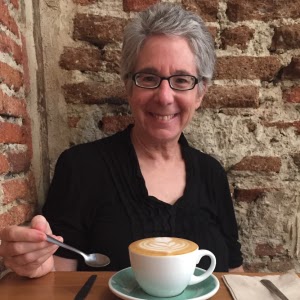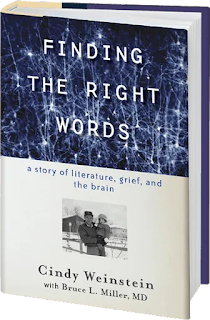Cindy Weinstein is the author, with Dr. Bruce L. Miller, of the book Finding the Right Words: A Story of Literature, Grief, and the Brain. It focuses on her father's experiences with Alzheimer's disease. Weinstein is the Eli and Edythe Broad Professor of English at the California Institute of Technology.
Q: Why did you decide to write this book about your father's experiences with early-onset Alzheimer's disease, and what impact did it have on you to write the book?
A: I wanted to write this book for a long while because I loved my father so much and wanted readers to know the amazing person I lost. What I needed to write about was the terrible synchronicity of becoming an English professor while my father was losing words.
It was important to tell the story of his dementia, and the intensity of my grief, in a way that would also help readers learn about the brain, which is why I wanted to write it with Bruce.
The impact has been profound, mostly because I didn’t know if the story would resonate. Hearing readers say that it’s helped them is what my father would have wanted, and though I wish I never had to write the book, this makes me glad.
Q: How did you end up working with Dr. Bruce Miller on the book, and what was your collaboration process like?
A: I met Bruce through a neurologist at Santa Barbara with whom I’d been in touch about the book. I emailed Bruce, told him I’d be in Berkeley doing research, told him my idea for the book, and he invited me to meet him at UCSF.
We hit it off immediately. We talked about books, about music, and then at a certain point he asked me, “Do you want to learn some science?”
I said yes, and he encouraged me to apply to the Global Brain Health Institute, an interdisciplinary program housed at UCSF’s Memory and Aging Center (with another location at Trinity College Dublin).
I was accepted and in 2018-19 studied brain health, specifically dementia, with an international cohort of colleagues who were geriatricians, artists, and neurologists.
In terms of our collaboration, I arrived with two drafted chapters under my belt, which were revised significantly as I learned more neurology.
Bruce and I would meet monthly after I had my section written, whether the topic was diagnosis, word-finding, spatial disorientation, behavior, or memory. We read each other’s work, commented, revised, and as that process unfolded we got to know each other better and our voices started harmonizing.
Q: How was the book's title chosen, and what does it signify for you?
A: I picked the title and it’s meant to signify in all sorts of ways. I’m finding the right words to explain my grief. Neurology (and Bruce) helped me find the words to explain my father’s dementia. My father’s first symptom was an inability to find words.
I had lots of words as an English professor, but they were inadequate to describe the agony of watching my father die the way he did. And when all is said and done, I realized that even if he couldn’t find the right words, I still always knew he loved me.
Q: What do you hope readers take away from the book?
A: I hope readers learn some of the basics of neurology so if and when they find themselves in a doctor’s office, they will have heard words like temporal lobe or aphasia and not be completely bewildered.
I hope my father’s story, much of which took place decades ago, serves as a cautionary tale. The use of medicine was not a last resort and it should have been. He had trouble hearing and sleeping and we didn’t know these were possible signs of trouble.
The stigma that he and my mother experienced, that so many still do, must end. I hope my story of grief and guilt helps readers be kinder to themselves and be more willing to ask for help.
Q: What are you working on now?
A: I’m working on several things, including a book on Edgar Allan Poe and authors and artists inspired by him. I’ve written a chapter on Poe and Vladimir Nabokov and another one on Poe and Rene Magritte.
I’m also talking to Bruce about writing another book together, which will begin with a chapter on Emily Dickinson and her poems about the brain.
I’m also committed to outreach efforts for Finding the Right Words and plan on continuing to do podcasts, interviews, radio shows, and book groups.
Q: Anything else we should know?
A: The book is sad, but there is humor, in addition to some great images from many decades ago. These images, including ones of the brain, which show what the deterioration of the brain looks like, can be found on the book website. https://weinsteinandmiller.com
--Interview with Deborah Kalb


No comments:
Post a Comment